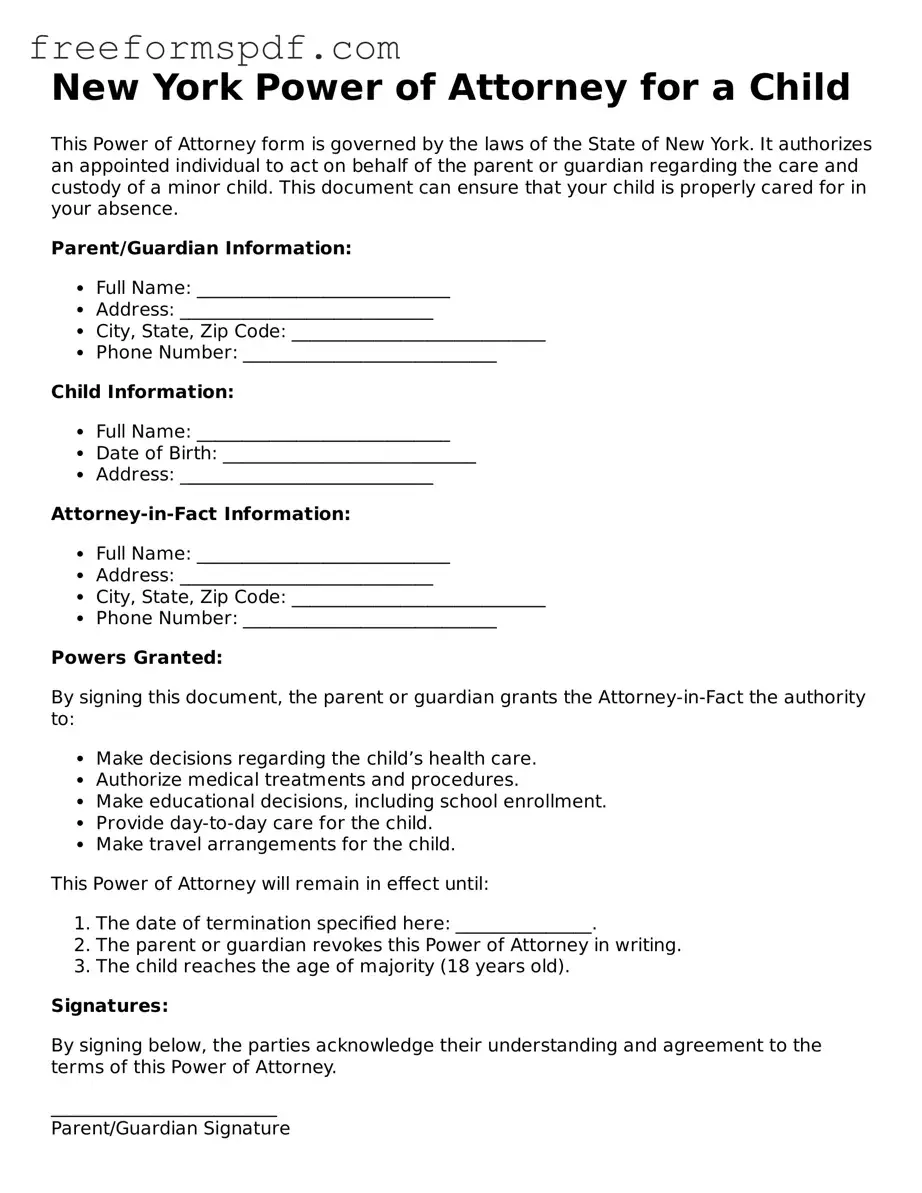Attorney-Verified Power of Attorney for a Child Document for New York State
Common mistakes
-
Not including the child's full name: It's crucial to provide the complete legal name of the child. Omitting any part of the name can lead to complications.
-
Incorrectly identifying the agent: The person designated as the agent must be clearly identified. Make sure to include their full name and address.
-
Failing to specify the powers granted: Clearly outline what powers the agent will have. Vague language can create confusion and limit the agent's ability to act.
-
Not signing the document: A signature is essential. Without it, the document is not valid. Ensure that all required parties sign the form.
-
Neglecting to date the form: Always include the date when the form is signed. This helps establish when the powers take effect.
-
Forgetting to have witnesses or a notary: Depending on the requirements, you may need witnesses or a notary public. Failing to include them can invalidate the form.
-
Not reviewing the form before submission: Take time to double-check the entire document. Errors can lead to delays or issues in the future.
-
Ignoring state-specific requirements: Each state may have different rules. Make sure to follow New York's specific guidelines for the Power of Attorney for a Child.
Learn More on This Form
-
What is a Power of Attorney for a Child in New York?
A Power of Attorney for a Child is a legal document that allows a parent or guardian to delegate their authority to make decisions on behalf of their child to another adult. This can include decisions related to education, healthcare, and general welfare. It is particularly useful in situations where the parent or guardian may be unavailable, such as during travel or extended absences.
-
Who can be designated as an agent in the Power of Attorney for a Child?
The agent, often referred to as the attorney-in-fact, can be any responsible adult, including relatives, family friends, or trusted neighbors. It is crucial to choose someone who is reliable and understands the responsibilities that come with this role. The agent must also be willing to accept the authority granted to them.
-
How long is the Power of Attorney for a Child valid?
The Power of Attorney for a Child remains valid until the specified expiration date, if provided, or until the parent or guardian revokes it. In general, it is advisable to review and renew the document periodically, especially if circumstances change or if the child reaches a new developmental stage.
-
Do I need to have the Power of Attorney for a Child notarized?
Yes, the Power of Attorney for a Child must be signed by the parent or guardian in the presence of a notary public to be legally valid. This step helps to ensure that the document is authentic and that the parent or guardian fully understands the implications of granting this authority.
-
Can I revoke the Power of Attorney for a Child once it has been established?
Absolutely. A parent or guardian has the right to revoke the Power of Attorney at any time, as long as they are of sound mind. To revoke it, a written notice should be provided to the agent and any relevant parties, such as schools or healthcare providers. It’s important to keep a record of the revocation for future reference.
Misconceptions
Many people have misunderstandings about the New York Power of Attorney for a Child form. Here are six common misconceptions:
- It can only be used for medical decisions. Some believe the form is limited to medical decisions regarding a child. In reality, it grants authority for various responsibilities, including education and general care.
- Only parents can complete the form. While parents often use this form, it can also be executed by legal guardians or others with parental rights. It is not restricted solely to biological parents.
- It must be notarized to be valid. Many think that notarization is a requirement for the Power of Attorney to be effective. However, while notarization is recommended for authenticity, it is not a strict legal requirement in all cases.
- It remains valid indefinitely. Some individuals assume that once the form is completed, it lasts forever. The truth is that the Power of Attorney for a Child is typically valid until the child turns 18, or until it is revoked.
- It can only be used in New York. There is a misconception that this form is only applicable within New York State. However, it can be recognized in other states, depending on local laws and regulations.
- It transfers full custody of the child. Many people mistakenly believe that signing this form gives the agent full custody rights. In fact, it allows for specific responsibilities but does not transfer legal custody of the child.
Some Other Power of Attorney for a Child State Templates
Durable Power of Attorney Oregon - Parents should review this document periodically to ensure it remains up-to-date.
To streamline the rental process, landlords can utilize the Nyc Apartment Registration Form, which not only aids in compliance with housing regulations but also fosters transparency between owners and tenants. For those seeking templates to help with the registration, resources like NY Templates provide valuable assistance.
Does a Power of Attorney Need to Be Recorded in Pennsylvania - Enables smoother transitions for children during caregiving mix-ups.
Power of Attorney Wa - Facilitates access to essential services when parents are unavailable.
Temporary Power of Attorney for Child - Informs third parties of the authority of the designated adult.
